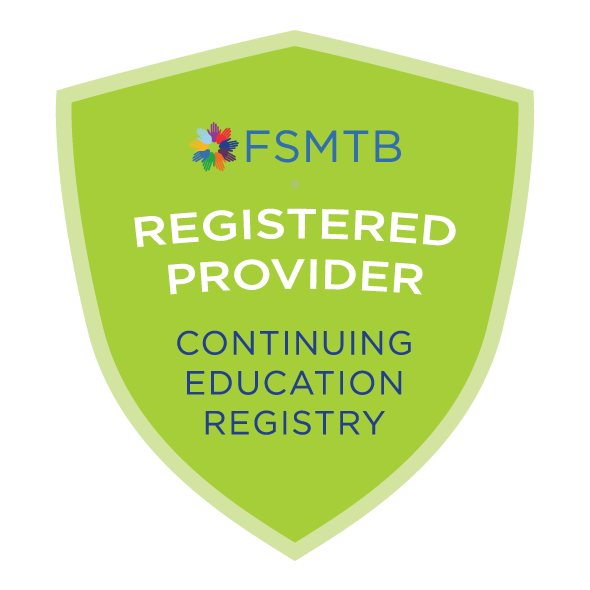
The FSMTB CE Registry is a database that contains continuing education courses for massage therapists that are provided by educators who meet and adhere to the FSMTB CE Standards & Registry Guidebook.
Register as a CE Provider to have your courses featured in CE Registry.
All courses listed by CE Providers in CE Registry must adhere to the standards outlined in the FSMTB CE Standards & Registry Guidebook.
CE Providers are monitored for an ongoing demonstration of compliance through student feedback.
Course completion records are stored in the national Massage Therapy Licensing Database (MTLD). State regulatory boards determine if the continuing education hours meet the requirements for licensing renewal in their state.
How do I sign up as a CE Provider?
Click the button below and follow the directions for registration. Be sure to read the CE Standards and Guidebook before you register.

CE Registry Provider FAQs
All courses listed by CE Providers must adhere to the Continuing Education standards set forth by FSMTB. Specific information about the requirements of a CE Provider can be found in the CE Standards and Guidebook.
- CE Registry will help your business get national exposure.
- CE Registry is simple to use (based on actual user feedback) and updated daily. It’s a trusted, reliable resource.
- Completion records will automatically load into the national Massage Therapy Licensing Database (MTLD) where state regulatory boards can instantly access information.
- CE Registry will provide you with access to student feedback collected independently by FSMTB.
- CE Registry benefits both you and your students. It’s a win-win opportunity.
The fee to register as a CE Provider is $100 for the first year. The renewal fee is $125, paid annually from the account’s creation date.
Please note that fees are not refundable and not transferable. The FSMTB only accepts VISA or Mastercard.
The fee for course submission is $35. Once approved, the course is valid for a period of five years (unless the course changes in any way or the CE Provider’s registration is revoked).
Please note that fees are not refundable and not transferable. The FSMTB only accepts VISA or Mastercard.
Enhanced Survey Feedback Fee
- By course (per download) $25
- By instructor (per download) $25
Additional Administrator User Access Fee (3 users are included) $25
Please note that fees are not refundable and not transferable. The FSMTB only accepts VISA or Mastercard.
No. CE Registry provider registration or course submission fees are not refundable in part or in full.
You can teach the course as often as you want to within five years of initial approval.
Courses can be taught as a Live – Webinar, Live – On Site, or On Demand.
- Live – Webinar describes a seminar or workshop in which the instructor and students view the same screen at the same time.
- Live – describes Instruction in a classroom environment where the instructor and students are together at the same time and in the same physical location.
- On Demand describes a course that students can complete on their schedule and at their own pace.
State regulatory boards determine if continuing education hours meet their requirements for license renewal. The best ways to know if your state board accepts these courses are to either review your state board’s website or contact the board and ask them about their continuing education policies.
The following states currently accept courses from providers in CE Registry.
|
|
|
|
One of the best benefits of CE Registry is that providers can gain national exposure through the course search feature. Even if Statutes/Rules in your state are still being updated, you can offer your registered courses to all the states that already accept courses from CE Registry.
- Register online at fsmtb.org.
- Attest to the accuracy of the information.
- Read, understand, and agree to the Terms and Conditions.
- Pay the registration fee.
- Submit courses that meet the FSMTB CE Standards.
- Pay the course submission fee.
- Add one or more sessions.
- After students complete the course, upload the course completion information, including the date, license number(s), and student email information.
Click the button below and follow the directions for registration. Be sure to read the CE Standards and Guidebook before you register.
The FSMTB has determined that courses taught in the following categories are acceptable for inclusion in the CE Registry. Inclusion does not guarantee acceptance for license renewal; only state licensing boards have the authority to accept continuing education for license renewal.
Anatomy & Physiology – Courses designed to provide students with a comprehensive understanding of the structures and functions of the human body.
Applications & Tools – Courses designed to equip students with the essential skills and knowledge necessary to proficiently utilize a variety of applications and tools in the practice of massage therapy.
Applications – Courses designed to explore the strategic use of various topical applications, such as hydrotherapy, thermotherapy, and cryotherapy, to augment the therapeutic outcomes of massage treatments.
Tools – Hand-operated devices designed to replicate or enhance manual actions used in massage treatments.
Instructor Training for the Massage Profession – Courses designed to equip individuals with the skills and knowledge necessary for instructors in the field of massage therapy.
Kinesiology – Courses that focus on the mechanics, anatomy, and physiology of human movement.
Eastern/Asian Modalities – Courses designed to provide comprehensive instruction in a range of Eastern and Asian massage techniques.
Western Modalities – Courses designed to provide comprehensive instruction in a range of Western massage techniques.
Pathology – Courses designed to provide students with a comprehensive understanding of diseases that impact the human body and how various medical conditions can influence massage practices and client care.
Pharmacology – Courses designed to educate students on ways in which medications interact with massage techniques, including the effects of medications on body systems, potential contraindications, and the importance of informed decision-making
Professional Practice – Courses in the following topic areas:
|
|
|
Regulatory Ethics – State-required regulatory education courses:
|
|
|
Research – Courses designed to equip students with essential skills and knowledge required to conduct scientific research in the massage therapy field.
Special Populations – Courses focused on equipping students with the knowledge and skills required to deliver effective massage treatments tailored to diverse client populations with unique needs and considerations.
|
|
|
Other – Miscellaneous courses: This category encompasses courses with unique or diverse subject matter that are not found in any other predefined category. These courses will be reviewed for approval.
The FSMTB does not accept courses outside of the massage therapy scope of practice. Some unacceptable course types include:
|
|
|
Email ce@fsmtb.org. A support specialist will contact you to address your question(s).
